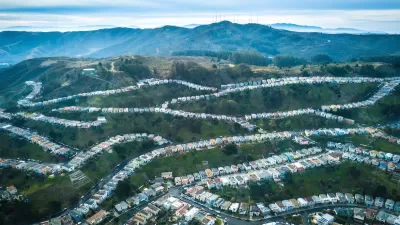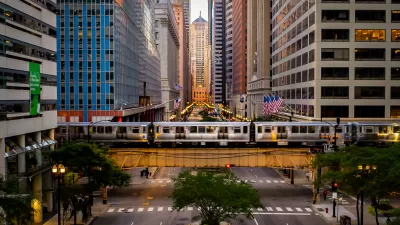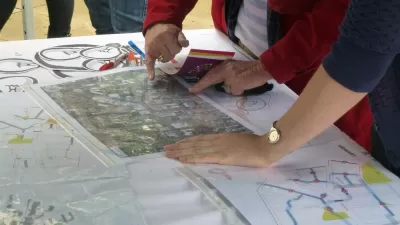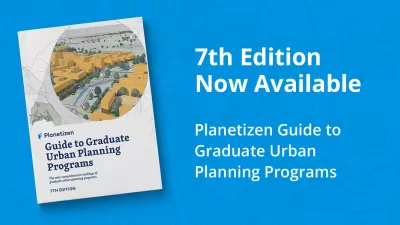Growing up in Rockaway, Queens led me to the planning profession, just as home town experiences lead many students to city planning. It's easy to forget why we became planners: we need to remember.

At the annual Spring Banquet at the Georgia Tech School of City and Regional Planning, I shared thoughts with our students about how my experience growing up in Rockaway, Queens, led me to the planning profession, and my hopes for the students' own careers.
Rockaway is a district "in the outer boroughs," as New Yorkers would say.
In the early 20th century, Rockaway was a beautiful shoreline resort with a wonderful park named after Jacob Riis, elegant hotels, beautiful summer homes for the wealthy, and comfortable summer bungalows for the working class.
By the time I lived there in mid-century, the elegant homes were largely gone, their patrons having moved on to newer and fancier beaches, and the working class bungalows were being torn down, replaced by public housing projects. City agencies were moving many on public assistance to Rockaway in large numbers. The NYC subway was serving Rockaway on an old rail road line right of way, albeit with double fare, since Rockaway's residents were afraid that cheap subway access would bring an undesirable element.
Nearby, Jamaica Bay, which many of you have looked at as you landed at Kennedy Airport (we called it Idlewild Airport when I was little), was the depository for effluent from 11 sewage treatment plants. There was a public order prohibiting commercial fishing, but early every morning you could see fisherman on the bridges across the bay, with lines in the water and buckets filled with tonight’s dinner for their families.
As a high school boy, I loved the undeveloped islands in the middle of the bay, and I was delighted when Gateway National Recreation Area was formed and those islands came under the sensitive care of park rangers.
You may remember Rockaway as where AA flight 587 crashed in November 2001, two months after 9/11, killing 265 people. You may also know it as one of the worst struck neighborhoods during Superstorm Sandy in 2012. But, I remember earlier times. Times when the tensions between rich and poor and between natural and built played out in front of me.
I left Rockaway determined to do something to help resolve those tensions better than it seemed my parent's generation resolved them. Rockaway led me to planning school, just as the development pressures and social tensions of your home towns led many of you to planning school. Like me, you came here to make a difference; to make your home towns, and others like them, better.
These last years you've learned a great deal that will make it possible for you to make those towns better. And, you've honed the personalities that may make it possible for you to withstand the battles necessary to succeed.
But you've also been influenced by new forces that may distract you from your earlier goals. Many of you have student loans to repay. Many have, or will soon have, families to care for. The insidious pressures of ambition have started you thinking about prestige, power, and pay. You will be tempted to serve many purposes in the years ahead.
I hope you will remember your Rockaway, that you will keep in mind why you chose city planning, and that you will stay true to the ideals of our profession and the goal to make our communities better. Congratulations on your graduation. Now make good on the promises you made yourself.

Depopulation Patterns Get Weird
A recent ranking of “declining” cities heavily features some of the most expensive cities in the country — including New York City and a half-dozen in the San Francisco Bay Area.

California Exodus: Population Drops Below 39 Million
Never mind the 40 million that demographers predicted the Golden State would reach by 2018. The state's population dipped below 39 million to 38.965 million last July, according to Census data released in March, the lowest since 2015.

Chicago to Turn High-Rise Offices into Housing
Four commercial buildings in the Chicago Loop have been approved for redevelopment into housing in a bid to revitalize the city’s downtown post-pandemic.

Google Maps Introduces New Transit, EV Features
It will now be easier to find electric car charging stations and transit options.

Ohio Lawmakers Propose Incentivizing Housing Production
A proposed bill would take a carrot approach to stimulating housing production through a grant program that would reward cities that implement pro-housing policies.

Chicago Awarded $2M Reconnecting Communities Grant
Community advocates say the city’s plan may not do enough to reverse the negative impacts of a major expressway.
City of Costa Mesa
Licking County
Barrett Planning Group LLC
HUD's Office of Policy Development and Research
Mpact Transit + Community
HUD's Office of Policy Development and Research
City of Universal City TX
ULI Northwest Arkansas
Town of Zionsville
Write for Planetizen
Urban Design for Planners 1: Software Tools
This six-course series explores essential urban design concepts using open source software and equips planners with the tools they need to participate fully in the urban design process.
Planning for Universal Design
Learn the tools for implementing Universal Design in planning regulations.



























